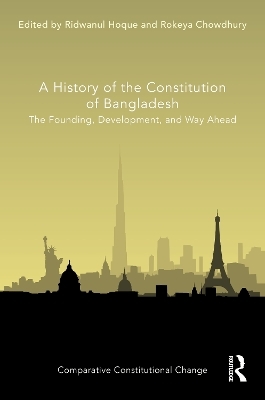
A History of the Constitution of Bangladesh
Routledge (Verlag)
978-1-032-23329-1 (ISBN)
Marking the 50th anniversary of Bangladesh's Constitution, this book gauges its development from 1972 to 2022, focusing on its foundational goals, performances, and current challenges.
The collection, presenting diverse but issue-specific chapters, shows how the people, political parties and leaders, and constitutional and legal institutions interact with each other in advancing, breaking, and remaking their Constitution. It examines the local context, parliamentary history, and interpretive tools adopted by the Supreme Court in understanding the Constitution as well as the future prospect of constitutional politics and practices. The work brings together legal professionals and constitutional law scholars to encapsulate the panorama of the country’s constitutional evolution. The authors look back to the history of constitution-making, to reflect critically on the present in light of the founding goals, spirits, and aspirations and with a view to offering a forward-looking and resilient vision of constitutionalism in Bangladesh.
The book will be of interest to researchers, academics, and policy-makers working in the areas of comparative constitutional law and politics and South Asian Studies.
Ridwanul Hoque is Senior Legal Officer at Charles Darwin University, Australia. Rokeya Chowdhury is an independent law and society researcher and is currently working with a Montreal-based law firm as its Senior Corporate Mobility Advisor.
1. Introduction: The Fifty Years of Bangladesh’s Constitutional Journey: Reflections and Hopes; Part I: The Founding of the Constitution, Competing Legal Norms and Identity Building; 2. Emergence of Bangladesh’s Legal System: Revolutionary Legality and a New Rule of Recognition; 3. The Constitution of Bangladesh and International Law; 4. Secularism and Islam as the State Religion: Conflict or Co-existence?; Part II: Constitutionalism, Rule of Law, and Judicial Review; 5. Rule of Law within the Constitutional Scheme: A Judicial Perspective; 6. Judicial Policy-making by the Supreme Court of Bangladesh; 7. Judicial Review and Separation of Powers: Is one Contingent upon the Other?; Part III: Political Parties, Executive Authority, and Parliament under the Constitutional Scheme; 8. Constituting Limits and Accountability of the Executive Power in Bangladesh; 9. Parliament of Bangladesh: Constitutional Position and Contributions; 10. Political Parties in the Process of Constitution-making and Amending: From Multi-party to One-party Dominant Politics?; Part IV: Social Justice, Inclusion, and the Protection of Rights; 11. Constitutional Protection of Economic and Social Human Rights: Intention of the Constitution Makers and Judicial Interpretations; 12. Locating women within ‘we, the people’ of Bangladesh; 13. Justice as Fairness and the Constitution of Bangladesh; 14. Conclusion: Constitutionalism Interrupted or Constitutionalism Absent? The Divergence of Constitution and Politics in Bangladesh
| Erscheinungsdatum | 05.09.2023 |
|---|---|
| Reihe/Serie | Comparative Constitutional Change |
| Zusatzinfo | 2 Line drawings, black and white; 2 Illustrations, black and white |
| Verlagsort | London |
| Sprache | englisch |
| Maße | 156 x 234 mm |
| Gewicht | 80 g |
| Themenwelt | Geisteswissenschaften ► Philosophie |
| Naturwissenschaften ► Geowissenschaften ► Geografie / Kartografie | |
| Sozialwissenschaften ► Soziologie ► Spezielle Soziologien | |
| ISBN-10 | 1-032-23329-X / 103223329X |
| ISBN-13 | 978-1-032-23329-1 / 9781032233291 |
| Zustand | Neuware |
| Informationen gemäß Produktsicherheitsverordnung (GPSR) | |
| Haben Sie eine Frage zum Produkt? |
aus dem Bereich


